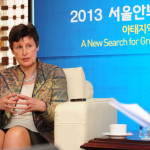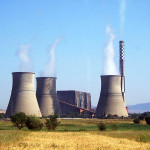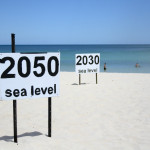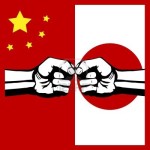- DETERRENCE: Work of the Advisory Board on Disarmament Matters
- DPRK: U.S. to hold more talks on North Korea with East Asian States
- ENERGY SECURITY: Slowdown in carbon emissions worldwide, but coal burning continues to grow
- GOVERNANCE AND CIVIL SOCIETY: With visits to all 10 ASEAN nations, Abe’s China containment strategy complete
- CLIMATE CHANGE ADAPTATION: Cameron links typhoon Haiyan to climate change
- CLIMATE CHANGE AND SECURITY: What will adaptation cost? An economic framework for coastal community infrastructure
 DETERRENCE: Work of the Advisory Board on Disarmament Matters, Report of the Secretary-General to UN General Assembly, A/68/206 (26 July 2013) [PDF, 0.1MB]
DETERRENCE: Work of the Advisory Board on Disarmament Matters, Report of the Secretary-General to UN General Assembly, A/68/206 (26 July 2013) [PDF, 0.1MB]
In addition to a Middle East WMD-free zone, The UN Secretary General should consider appropriate action to establish a nuclear-weapon-free zone in North-East Asia, including by promoting a more active role for the regional forums in encouraging transparency and confidence-building among the countries of the region.
- U.N. official cautions against Asia armament, Song Sang-ho, Korea Herald (12 November 2013)
- Israel reportedly meets with Arab states to discuss WMD-Free Zone, Global Security Newswire (1 November 2013)
 DPRK: U.S. to hold more talks on North Korea with East Asian States, Global Security Newswire (15 November 2013)
DPRK: U.S. to hold more talks on North Korea with East Asian States, Global Security Newswire (15 November 2013)
Depending on how one counts the iterations, Six Party Talks heads of delegation have met almost a dozen times since Choe Ryong-hae went to Beijing in May – and not actually revived the Six Party Talks. President Elbedorj told a Kim Il-sung university audience Mongolia’s security is achieved via political, diplomatic and economic means including a Nuclear Weapons Free Zone. Improved China-ROK demonstrates non-zero sum security relations between U.S. and ROK and between China and North Korea.
- Lecture by President Tsakhiagiin Elbegdorj at Kim Il-sun University, North Korea, The Office of the President of Mongolia, Public Relations & Communications Division (30 October 2013)
- Ties between China, Seoul on a new level, affirms Yang, Sarah Kim, Joongang Ilbo (19 November 2013)
- Meeting with DPRK Deputy Minister of Foreign Affairs Global Partnership for the prevention of armed conflict, Global Partnership for the Prevention of Armed Conflict (21 October 2013)
 ENERGY SECURITY: Slowdown in carbon emissions worldwide, but coal burning continues to grow, Justin Gillis and David Jolly, New York Times (18 November 2013)
ENERGY SECURITY: Slowdown in carbon emissions worldwide, but coal burning continues to grow, Justin Gillis and David Jolly, New York Times (18 November 2013)
Apocalypse Now, 2013 annual edition live from Warsaw. Now it’s come down to the real issue – money: whether the rich countries would put up $100 billion for the Green Climate Fund compared to $60 billion the US Congress authorized after Hurricane Sandy. The world is vastly different from 1992, when UNFCCC included the “agreed incremental cost” language (borrowed from the Montreal Protocol, with no idea what it meant). Now slogans for imaginary “climate injustice” and “loss and damage” are being tossed around. Instead of CO2 mitigation, the money should go to boosting public health, if people mattered.
- Will Warsaw climate talks point way to new deal? Karl Ritter and Monika Scisolowska, AP via Boston.com (10 November 2013)
- Growing clamor about inequities of climate crisis, Steven Lee Myers and Nicholas Kulish, New York Times (16 November 2013)
GOVERNANCE AND CIVIL SOCIETY: With visits to all 10 ASEAN nations, Abe’s China containment strategy complete, Asahi Shimbun (18 November 2013)
Japan’s PM has visited all ten ASEAN nations since taking office last year, stressing security ties in an effort to curb China’s influence in the region. Japan is also discussing increased security ties with Russia. China’s response to the disaster in the Philippines is a continuation of the competition between the Asian powers for regional influence and alliance building in Southeast Asia.
- Japan, Russia in tie-up to defuse China influence, Reuters (2 November 2013)
- Asia rivalries play role in aid to Philippines, Andrew Jacobs, New York Times (14 November 2013)
 CLIMATE CHANGE ADAPTATION: What will adaptation cost? An economic framework for coastal community infrastructure, Final report, National Oceanic and Atmospheric Administration, Coastal Services Center (2013) [2.95 MB, PDF]
CLIMATE CHANGE ADAPTATION: What will adaptation cost? An economic framework for coastal community infrastructure, Final report, National Oceanic and Atmospheric Administration, Coastal Services Center (2013) [2.95 MB, PDF]
By comprehending the costs and benefits of various climate change adaptation approaches, community leaders can make more up to date and clued-up decisions that are monetarily conscientious in the short and long terms. Also, they can find answers to the questions, such as: how will ‘sea level rise’ and ‘enhanced storm surge’ distress the community? What is the outlay of not doing anything? What can be done to adapt to climate change? How the best adaptation approach can be decided? And how much will it cost to keep the community safe?
- Global sea level rise scenarios for the United States National Climate Assessment, US Climate Program Office (December 2012)
- The economic cost of greenhouse-induced sea-level rise for developed property in the United States, Gary Yohe et al., Climatic Change, vol. 32, issue 4, pp. 387-410 (1996) [subscription required]
 CLIMATE CHANGE AND SECURITY: Cameron links typhoon Haiyan to climate change, Rowena Mason and Damian Carrington, The Guardian (16 November 2013)
CLIMATE CHANGE AND SECURITY: Cameron links typhoon Haiyan to climate change, Rowena Mason and Damian Carrington, The Guardian (16 November 2013)
‘“As a practical politician, I think the sensible thing is to say let’s take preventative and mitigating steps given the chances this might be the case.”
Cameron’s comments also coincide with the United Nations talks on climate change in Warsaw, which has seen Japan slash its commitment to reducing CO2 emissions and Australia fail to send a minister to the conference for the first time in 16 years.’
- US military-led humanitarian intervention in the Philippines: a message to China, Jonathan Bogais, The Conversation (15 November 2013)
- Impacts of climate change observed in global precipitation patterns, Kate Prengaman, Ars Technica (17 November 2013)
- REDD+ and the underlying causes of deforestation and forest degradation, Global Forest Coalition (November 2013) [PDF, 2MB]
The Nautilus Peace and Security Weekly Report presents articles and full length reports each week in six categories: Austral security, nuclear deterrence, energy security, climate change and security, the DPRK, climate change adaptation and governance and civil society. Our team of contributors carefully select items that highlight the links between these themes and the three regions in which our offices are found—North America, Northeast Asia, and the Austral-Asia region.
Subscribe to NAPSNet to receive free weekly email reports
Editor
Contributors
- Deterrence: Peter Hayes
- Governance and Civil Society: Dyana Mardon
- Climate Change Adaptation: Saleem Janjua
- DPRK: Roger Cavazos
- Energy Security: Nikhil Desai
- Climate Change and Security: Richard Tanter


